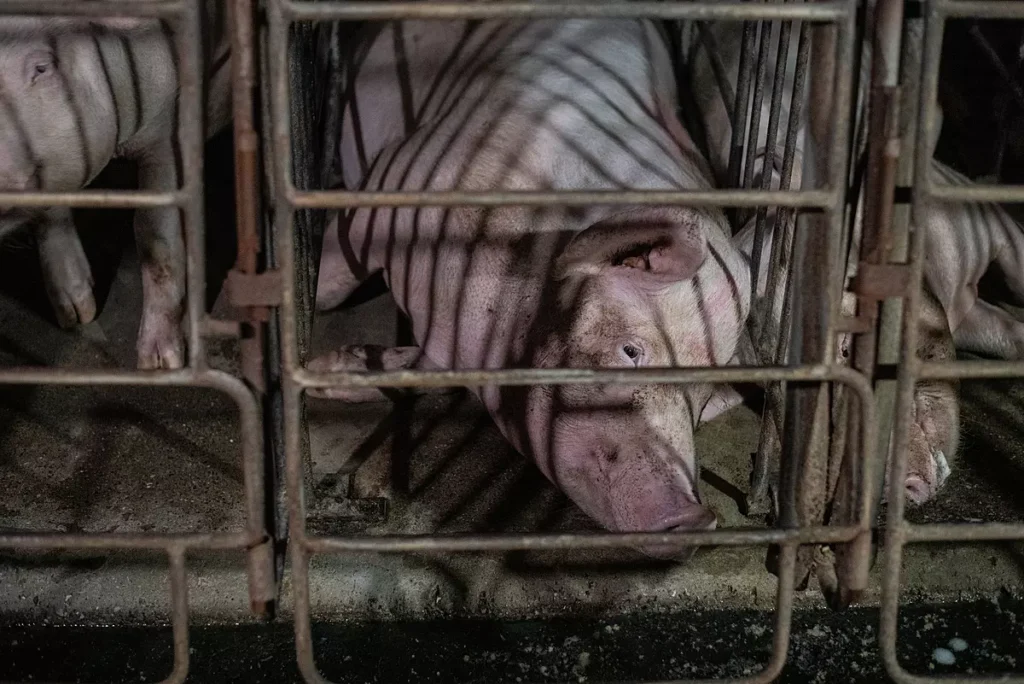No excuses for delay as U.S. Supreme Court rules Prop 12 is proper exercise of state authority
Washington, D.C. — With the U.S. Supreme Court rejecting the overreaching arguments of factory-farming interests in NPPC v. Ross last week, Animal Wellness Action and the Center for a Humane Economy wrote to California’s Food and Agriculture Secretary and the Attorney General and urged them to take intentional action toward robust implementation of California’s Proposition 12. Pork from factory farms in Iowa, North Carolina, and other states using gestation crates should no longer be sold in California.
The provisions in the law, set to be in full effect on Jan. 1, 2022, have been delayed, and the state reports that it will begin to enforce the restrictions on the sale of pork from extreme confinement operations on July 1.

“Voters approved Proposition 12 in a landslide five years ago to enshrine farm animal welfare standards into law,” said Wayne Pacelle, president of Animal Wellness Action and the key architect of the ballot measure. “Californians don’t want to contribute to extreme confinement of breeding sows in gestation crates that immobilize the animals. The law must speak and the will of the people must be honored. No more delays in implementation.”
Justice Neil Gorsuch, writing for the majority of the Supreme Court, held that the law is constitutional because it is fairly applied, and it reflects core social and scientific values related to the humane treatment of animals and food safety. This was a matter for voters and other policy makers to decide, not judges, wrote Gorsuch.
Animal Wellness Action and the Center today called on in-state food retailers to honor the will of voters and to implement the legally required procurement strategies stipulated in Prop 12 and the regulations that flow from them. The provisions restricting sales of eggs and veal are in effect, but the provisions restricting pork sales from animals kept in extreme confinement have been delayed by plodding work by the California Department of Food and Agriculture and by a series of lawsuits from agribusiness interests.
“Apart from the now resolved legal impediments, there are also no practical reasons why enforcement should not be immediate or that the pork industry is unable to meet the demands of California’s residents for humanely raised pork,” said Scott Edwards, general counsel for Animal Wellness Action and the Center for a Humane Economy. “The pork industry has been supplying gestation-crate free pork to the market for years, due to corporate and consumer buyers’ demand for it, and it’s time to stop bellyaching and give customers the product they demand.”
The nonprofits submitted a letter to the California Department of Food and Agriculture Secretary Katherine Ross and Attorney General Rob Bonta to urge them to take the necessary steps now to ensure that diligent compliance with and enforcement of the prohibition in the sale of pork from cruelly confined pig operations is fully implemented in the coming weeks. Restrictions on the sale of eggs and veal, as a matter of law, are already in place.
CDFA waited until May 2021 before publishing its Proposed Regulations to adopt the law as enacted. And even then, the regulations were an inadequate reflection of the priorities and concerns embodied in the ballot measure and moved forward by state voters. CDFA’s regulatory shortcomings compelled Animal Wellness Action and the Center for a Humane Economy to file suit in state court to compel the agency to issue regulations that properly reflected the goals of Prop 12. In response to the legal action, CDFA issued revised regulations that were only put on further hold as the agency litigated against state retailers.
With this week’s high court ruling, California can now prepare to enforce its humane-standards law immediately.
Major pork-producing companies, such as Hormel and Tyson Foods, have said that they can meet the demand for pork from more humanely raised animals. Thousands of farmers with Niman Ranch and other farming associations and cooperatives see the gestation-crate-free market in California as an economic opportunity.
Proposition 12 was preceded a decade earlier by Prop 2, which banned any extreme confinement of veal calves, laying hens, and gestating sows in California. Prop 12 built on that measure by adding sales restrictions on pork, eggs, and veal sold in the state.

